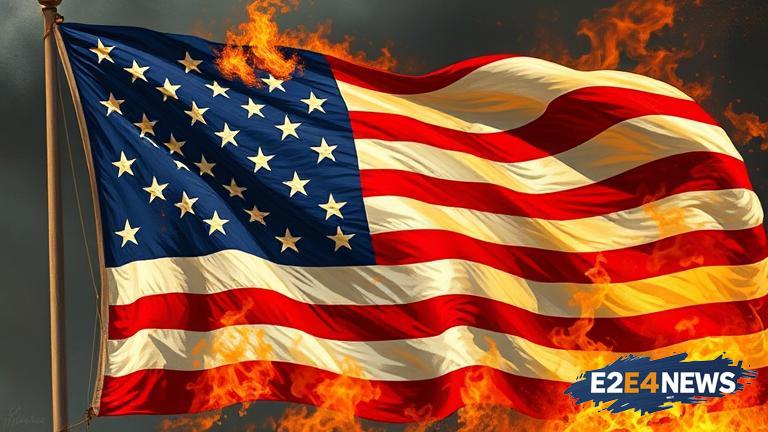In a move that has sparked intense debate and controversy, US President Donald Trump has signed an executive order that aims to impose harsher penalties for flag burning, including a potential one-year jail term for those found guilty of desecrating the American flag. The order, which has been met with widespread criticism from civil liberties groups and lawmakers, is seen as a significant escalation of the Trump administration’s efforts to crack down on dissent and free speech. Flag burning has long been a contentious issue in the United States, with many viewing it as a form of protest and others seeing it as a desecration of a national symbol. The Supreme Court has previously ruled that flag burning is a form of protected speech under the First Amendment, but Trump’s order appears to challenge this precedent. The order has been condemned by many as an attack on free speech and a blatant attempt to suppress dissent. Critics argue that the order is unconstitutional and will have a chilling effect on free speech, making people less likely to express their opinions or engage in peaceful protest. The American Civil Liberties Union (ACLU) has vowed to challenge the order in court, arguing that it is a clear violation of the First Amendment. The order has also been criticized by lawmakers from both parties, with some arguing that it is an overreach of executive power and others expressing concerns about the potential impact on free speech. Despite the backlash, the Trump administration has defended the order, arguing that it is necessary to protect the integrity of the flag and the values it represents. The order is seen as part of a broader effort by the Trump administration to promote patriotism and national pride, but critics argue that it is a thinly veiled attempt to suppress dissent and undermine the principles of free speech. The issue of flag burning has long been a divisive one in the United States, with many people viewing it as a deeply offensive act. However, others see it as a legitimate form of protest and a way to express dissent and challenge the status quo. The Supreme Court has previously ruled that flag burning is a form of protected speech, but Trump’s order appears to challenge this precedent. The order has sparked widespread outrage and condemnation, with many people taking to social media to express their opposition. The hashtag #NotMyPresident has been trending on Twitter, with many people using it to express their opposition to the order. The order has also been condemned by international human rights groups, who argue that it is a clear violation of international human rights law. The United Nations has previously stated that freedom of speech is a fundamental human right, and that any attempts to suppress it are unacceptable. The order has significant implications for the future of free speech in the United States, and it remains to be seen how it will be implemented and enforced. The Trump administration has argued that the order is necessary to protect national security and prevent violence, but critics argue that it is a blatant attempt to suppress dissent and undermine the principles of free speech. The order has sparked a national debate about the role of free speech in American society, and it remains to be seen how it will be resolved. The issue of flag burning is a complex and contentious one, and it is likely to continue to be a source of debate and controversy in the months and years to come. The Trump administration’s efforts to crack down on dissent and free speech have been widely condemned, and it remains to be seen how the order will be implemented and enforced. The order has significant implications for the future of American democracy, and it is likely to have far-reaching consequences for the country and its people.
